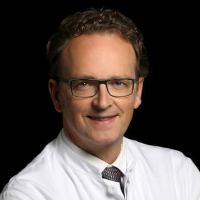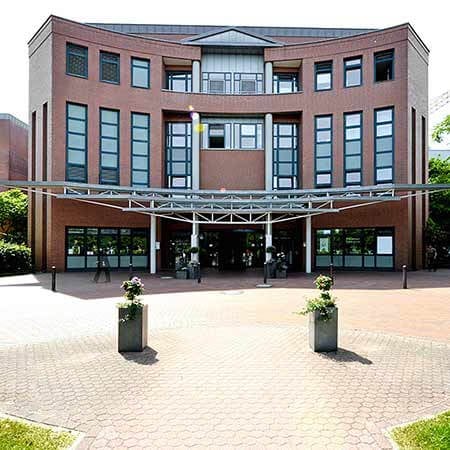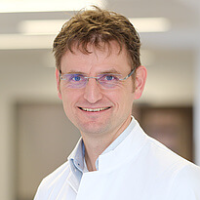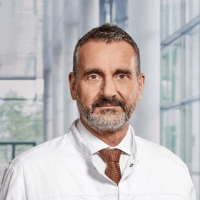Mitral Valve Insufficiency (prolapse) — Repair of Mitral Valve (minimally Invasive): treatment in the Best Hospitals in the World
Treatment prices are regulated by national law of the corresponding countries, but can also include additional hospital coefficients. In order to receive the individual cost calculation, please send us the request and medical records.

Department of Cardiothoracic Surgery
According to the Focus magazine, the Department of Cardiothoracic Surgery ranks among the top German medical facilities specializing in the surgical treatment of diseases of the cardiovascular system and lung cancer! The department offers the full range of surgical services for the treatment of diseases of the cardiovascular system, respiratory tract, including heart and lung transplantation, artificial heart implantation. The therapeutic options include aortic surgery, coronary artery bypass grafting, transplantation surgery, surgical treatment of heart rhythm disorders (arrhythmias), minimally invasive surgery, surgical treatment of the heart valves, including reconstructive interventions. All operations are performed using state-of-the-art technology and in accordance with the current recommendations of professional societies.






Department of Cardiac Surgery
The Department of Cardiac Surgery provides a full range of surgical treatment in its area of specialization. Special emphasis is placed on heart valve repair and replacement surgery, coronary artery bypass grafting, thoracic aortic surgery, adult congenital and acquired heart disease surgery, pacemaker and defibrillator implantation, and artificial heart implantation for severe heart failure. Many heart operations are performed using minimally invasive techniques, which has a positive effect on the healing of the surgical wound. Minimally invasive cardiac procedures also reduce surgical risks and contribute to a rapid recovery of the patient in the postoperative period. Surgical treatment of cardiac pathologies is performed in advanced operating rooms equipped with the latest technology. The cardiac surgeons of the department successfully perform routine and complex surgical procedures, saving the lives of thousands of patients. The specialists work in accordance with current clinical protocols and follow the recommendations of the German Society for Thoracic and Cardiovascular Surgery (DGTHG).


Department of Cardiothoracic Surgery and Vascular Surgery
The Department of Cardiothoracic Surgery and Vascular Surgery provides effective surgical treatment for diseases of the heart, respiratory system, and blood vessels. The team of cardiac surgeons operates on patients with heart valve pathologies, coronary heart disease, heart failure, and heart rhythm disturbances. In the field of thoracic surgery, the key focus is on the surgical removal of lung tumors and lung metastases. The specialists in this area also perform surgery to repair chest wall deformities. In the field of vascular surgery, interventions for abdominal and thoracic aortic aneurysms are most often performed here. The department's vascular surgeons are also exceptionally competent in the treatment of peripheral occlusive arterial disease. A great advantage for the department's patients is that almost all surgical interventions are performed using minimally invasive techniques, so there is no need for a long postoperative recovery. The department's operating rooms are equipped with state-of-the-art technology. This allows for effective and safe treatment. The priority is always personalized medical care for patients.






Mitral valve disease is a defect in which there is a reverse flow of blood (mitral regurgitation) from the left ventricle to the left atrium due to incomplete closure of the valve leaflets.
Overview
The essence of mitral valve disease, or mitral regurgitation, is a violation of the valve closure function due to fibrous deformation of the leaflets, subvalvular structures, and violation of the integrity of the mitral valve elements. This causes the return of some blood from the left ventricle to the atrium. These disorders of intracardiac hemodynamics may be accompanied by the development of pulmonary hypertension syndrome.
The mitral valve has two cusps and opens to allow blood to flow into the left ventricle. The valve is then closed to prevent blood from flowing back into the left atrium. In mitral regurgitation, this valve does not close tightly, allowing blood to flow back into the left atrium during the ventricular contraction.
A chronic deficiency of magnesium plays an important role in the pathogenesis of primary or congenital mitral valve insufficiency. Lack of magnesium leads to the production of defective elastin and collagen by fibroblasts. As a result, the structure and function of the connective tissues of the heart are impaired.
The secondary form of mitral regurgitation occurs as a result of past diseases and injuries. With pathology, the cavity of the left ventricle expands, the leaflets of the mitral valve bend, dysfunction of the muscles, and rupture of the chords connecting the valves with the papillary muscles arise. Sometimes the cause of the secondary mitral valve insufficiency development is the calcification of the valve annulus. Mitral annulus calcification is a chronic degenerative process in which calcium is deposited in the valve annulus. The mitral ring becomes thicker and less flexible.
Causes
Possible causes of mitral valve disease include:
- Acute rheumatic fever
- Bacterial endocarditis
- Deposition of calcium in valve tissues
- Connective tissue diseases
- Traumatic detachment of the valve leaflets during heavy physical exertion
- Trauma during heart surgery
- Thickening of the valve flaps
- Atrial tumors
- Radiation therapy
Mitral regurgitation is in first place among all acquired valvular heart diseases. Pathology rarely occurs independently; mitral regurgitation is often combined with mitral stenosis and aortic valve defects.
Symptoms
Symptoms of mitral valve disease include:
- General weakness and dizziness
- Heart palpitations
- Shortness of breath that occurs even with light-intensity physical activity
- Aching, pressing, and stabbing pains in the heart, which can radiate to the left shoulder and arm
- Frequent colds
- Memory impairment, panic attacks, anxiety, suspiciousness (this is due to a lack of oxygen supply to the brain, impaired metabolic processes, and a slowdown in the transmission of impulses between neurons)
- Trembling in the body
- Frequent bruising
- Discomfort when being in a closed and stuffy room, fainting
Constant anxiety often leads the patient to consult a psychiatrist or neurologist. It is very important not to involve such patients into professional sports, as excessive physical loads can cause death.
Diagnostics
When collecting anamnesis, the cardiologist specifies:
- Whether the patient feels a lack of air when inhaling
- Whether interruptions in the work of the heart bother the patient
- Whether shortness of breath occurs with minor physical exertion
- Whether anxiety or panic attacks occur
Auscultation (listening to the heart sounds) reveals a systolic heart murmur at the apex and above the base of the heart.
Phonocardiography (PCG) is important for the diagnosis of mitral valve disease. PCG is a method for studying the work of the heart muscle, which is based on the registration and subsequent analysis of the sounds that are produced during the work of the heart.
Another important instrumental diagnostic method is echocardiography. Echocardiography is a painless ultrasound examination that allows doctors to examine the work of the heart in real-time. Echocardiography shows a decrease in the elasticity of the valve, its damage, the size of the opening of the mitral valve, and the distance between its leaflets. Also, the study can see the rupture of the papillary muscle and the sagging of the valve leaflets in the cavity of the left atrium.
Treatment
Many people have mild mitral valve insufficiency, which does not cause complications and in most cases does not require surgical mitral valve repair. If the deficiency is more severe, this leads to a load on the lungs and ultimately on other organs. Very often, a significant increase of the left atrium develops, since it needs to pump more blood than in case of a healthy mitral valve. Ultimately, when combined with damage to the heart muscle, this can lead to severe heart failure or irregular heart rhythms.
Timely mitral valve repair allows achieving good results and prevents the development of complications.
The main surgical methods for correcting mitral regurgitation include:
- Partial or complete valve replacement
- Mitral valve repair
With the less severe form of mitral valve disease, mitral valve repair is indicated.
For mitral valve repair, both open heart surgery and minimally invasive heart surgery are used, from the mitral valve repair procedures to operations for its complete replacement. A well-performed mitral valve repair is the best way to correct mitral valve insufficiency. If mitral valve repair is connected with a high risk, mitral valve repair can be performed with a minimally invasive method.
An example of minimally invasive mitral valve repair is annuloplasty, which involves restoring the function of the affected valve with a rigid or elastic support ring.
It is fixed to the walls of the heart at the level of the opening that connects the atrium with the ventricle. As a result of the suturing of such a support ring, the diameter of the atrioventricular opening decreases, which ensures a more complete closure of the valves and normalizes intracardiac blood flow.
Another option for minimally invasive mitral valve repair is heart surgery using various techniques. During this type of mitral valve repair, the surgeon performs heart surgery on the valve leaflets, removes calcified deposits, or restores the structure of the altered tendon chords that control leaflet movement.
The radical treatment for the mitral valve insufficiency is the mitral valve replacement. Modern artificial heart valves and biological valves are used.
In the case of severe morphological changes in the patient's valve, when its preservation is no longer possible, the valve is removed with subsequent prosthetics. Surgical mitral valve replacement is performed on a non-working heart, using a heart-lung machine.
Mechanical or artificial heart valves used in mitral valve replacement are reliable, serve a lifetime, and do not need to be replaced, but they require constant intake of special medications to reduce blood clotting. Biological valves (of animal or human origin) can deteriorate over time, and the function of these valves is highly dependent on the patient's age and concomitant diseases.
The decision about which valve is the best option in a particular situation is made individually, before the mitral valve replacement, during the discussion between the surgeon and the patient.
Technological progress in heart surgery, namely the introduction of new minimally invasive techniques of heart surgery, inevitably put forward the goal of performing mitral valve replacement with minimal intraoperative trauma.
The choice of the most rational method of mitral heart valve replacement is essential. Operational access should ensure the solution of the main tasks:
- To provide the surgeon with sufficient space for heart surgery performing
- The operative access should preferably be minimally invasive
The traditional surgical approach to heart surgery is median sternotomy.
On the one hand, it allows the surgeon to carry out the necessary surgical procedures for various forms of the pathology. This surgical access is the most convenient for connecting a patient to a heart-lung machine.
On the other hand, this access may not be optimal. There are several reasons for this:
- More severe trauma, the integrity of the chest is disrupted, which requires a longer period of postoperative wound healing
- High risk of postoperative complications (sternal instability)
- Cosmetic defects
All cardiac surgeons agree that mitral valve replacement with a minimally invasive approach should be performed with the same skill and quality as for open heart surgery.
Minimally invasive mitral valve replacement is performed by accessing the heart through an incision in the armpit, approximately 5-6 cm in size, creating access in the intercostal space, avoiding any incisions of the muscles, ribs, or sternum. Minimally invasive mitral valve replacement is a unique surgical technology that is very effective and quite cost-effective. In patients who underwent such an operation (with an axillary incision and the use of an endoscope), pain syndrome after heart surgery is less severe, the risk of infection, and the duration of hospitalization are reduced.
In some cases, mitral valve replacement may require only a few incisions. Patients with moderate to high risk and severe aortic valve stenosis are eligible for minimally invasive heart surgery.
Unlike conventional open heart surgery, in which about 10-12 incisions are made and the patient is connected to a heart-lung machine, during minimally invasive mitral valve replacement there is no need to connect the patient to these devices. The number of the incisions between the ribs, that is required for the surgical access, is reduced to 3-5 incisions or just a few small incisions. Minimally invasive heart surgery reduces the risk of bleeding and the need for blood transfusions.
Benefits of minimally invasive heart surgery in comparison to open heart surgery include:
- Milder pain syndrome. Since in minimally invasive mitral valve replacement the access to the heart is made through the skin incision that is about 7 cm long, the integrity of the chest is preserved.
- Reduced risk of complications. Since in minimally invasive mitral valve replacement the chest retains its integrity, the risk of developing such complications as postoperative instability of the sternum is excluded, unlike open heart surgery.
- Faster recovery and return to normal activities. Minimal surgical trauma and preservation of the chest functioning after minimally invasive mitral valve replacement allows early rehabilitation of patients, which helps to reduce the duration of inpatient treatment.
- Less visible scar. Most patients are very happy with the cosmetic result of minimally invasive heart surgery.
Minimally invasive mitral valve replacement can be performed in patients who cannot undergo open heart surgery. Minimally invasive heart surgery is most often used to reduce the invasiveness of the procedure while maintaining the same level of efficacy and safety of treatment as with open heart surgery.
Where can I undergo mitral valve repair abroad?
Medical tourism is becoming more and more popular these days, as medicine abroad often ensures a much better quality of mitral valve repair.
The following world’s and European hospitals show the best success rates in mitral valve repair:
- University Hospital Essen, Germany
- University Hospital Oldenburg, Germany
- Medipol Mega University Hospital Istanbul, Turkey
- University Hospital Ulm, Germany
- University Hospital Frankfurt am Main, Germany
You can find more information about the world’s and European hospitals on the Booking Health website.
The cost of treatment abroad with mitral valve repair
The prices in European hospitals listed on the Booking Health website are relatively low. With Booking Health, you can undergo mitral valve repair at an affordable price.
The cost of treatment abroad varies, as the prices depend on the hospital, the specifics of the disease, and the complexity of its treatment.
For example, the cost of treatment with mitral valve repair in Germany starts with 27,632 EUR, while the cost of treatment with mitral valve repair in Turkey starts with 16,427 EUR.
You might want to consider the prices of additional surgical procedures and follow-up care. Therefore, the ultimate cost of treatment with mitral valve repair in world’s and European hospitals may differ from the initial price.
To find out information about the overall cost of treatment abroad, you may contact us by leaving the request on the Booking Health website.
How can I undergo treatment abroad with mitral valve repair?
It is not easy to self-organize any treatment abroad. It requires certain knowledge and expertise. Thus, it is safer, easier, and less stressful to use the services of a medical tourism agency.
As the largest and most transparent medical tourism agency in the world, Booking Health has up-to-date information about mitral valve repair in the best European hospitals. We will help you select the right clinic taking into account your wishes for treatment.
We want to help you and take on all the troubles. You can be free of unnecessary stress, while Booking Health takes care of all organizational issues regarding treatment abroad with mitral valve repair. We provide our services so that you can undergo mitral valve repair safely and successfully.
Medical tourism can be easy! All you need to do is to leave a request on the Booking Health website, and our manager will contact you shortly.

